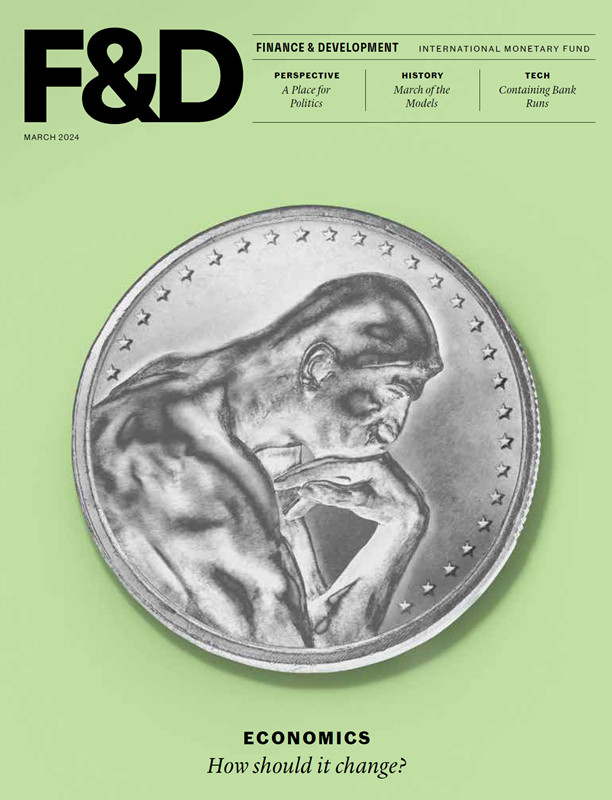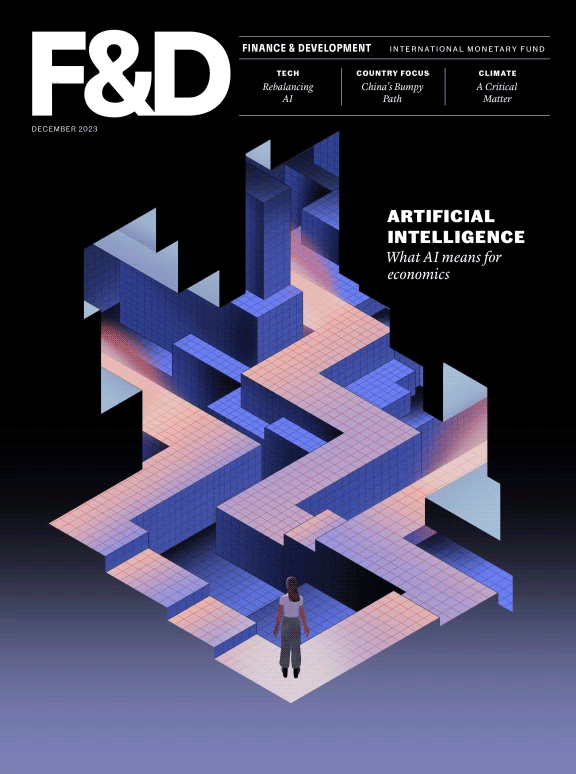Joshua Gans argues that assessing the power and pitfalls of AI requires putting it in the hands of people
In a conversation with F&D’s Marjorie Henriquez, Joshua Gans, coauthor of Power and Prediction: The Disruptive Economics of Artificial Intelligence, assesses AI’s impact on the economy, debunks overhyped concerns about the new technology, and explains the challenge of identifying an ethics enforcer. He also discusses why AI should be made accessible through competitive means and traded widely.
F&D: For years, economists have extensively studied the effects of automation, such as assembly line production, on jobs and the economy. How does this latest wave of AI differ from previous forms of automation?
JG: Previous waves of automation have focused on predominantly physical tasks, whereas AI tends to provide the potential to automate cognitive ones. However, even this distinction can be misleading. Invariably, past automation in the form of machines that performed physical tasks was automating something a human would do that involved not only physical interactions but also a cognitive expression of intent and application. And with the information technology revolution, many of the tasks—namely, computation—were automating cognitive processes.
The main difference is more in the ability of a machine to interact in variable and non-standardized environments. Thus, while it has been possible to make a machine that can pick up a specific object in a specific location and move it to another location, AI holds the promise of picking up and moving a random object that is not in a particular location. This requires a sense of the environment. Therefore, if there is a property AI has that moves beyond others, it is the ability to automate tasks in more varied contexts.
F&D: Looking ahead at the next five years, what do you anticipate as the most significant ways in which AI will impact productivity, employment, and income inequality?
JG: The evidence thus far shows that where AI has been employed in workplace tasks, it has often involved tools that allow people with lower skills and less experience to perform at the level of those with higher skills and more experience. For instance, demand prediction tools that indicate where there are potentially more fares available at a given time rolled out in Tokyo, allowing less experienced taxi drivers to waste less time looking for riders, whereas it did little to improve the productivity of experienced drivers.
Extrapolating from this, skill premia in certain occupations will be reduced, and employment opportunities will open up for a wider set of people. That will tend to increase productivity, raise employment, and lower income inequality—at least at certain ranges of the income distribution. Beyond the next five years, it is harder to forecast.
F&D: What key aspects of AI do you think are overhyped or overlooked in the current discussions on its impact?
If only I could tell with changes happening so quickly!
That said, alongside this rise has been an unusual amount of concern and worry about the adverse consequences that might follow from the use of generative AI. That is, in some sense, a measure of its success. Large language models, or LLMs, such as ChatGPT or Bard, are able to do writing tasks faster and better than people. Generative art can produce images that may have taken days or longer with existing tools. And the boost to coding tasks has been phenomenal. As a result of all this success, some extrapolate and see that people will be replaced in these tasks—and it will all happen too quickly.
The question we are asking ourselves right now is whether it would have been better if none of this stuff had been invented or, at least, if its adoption had been slowed down to give us time to assess the consequences. Precaution can motivate these things, but you have to balance that against the losses from slow adoption for productivity. Moreover, you cannot learn what those adverse consequences are without putting that stuff in the hands of people.
So, in general, I think the angst is overhyped in that it is more vague speculation than something involving clear or even less clear evidence. This is compared to productivity improvements that are very real and noticeable. This suggests that “letting it rip” is the right policy for the current moment.
Nonetheless, if one of the benefits of that policy is to learn what the adverse consequences might be, it behooves us to monitor for those consequences, identify their causes, and consider experimentation with policy interventions that can mitigate them. Speed has benefits but also means we have to work more intensively to ensure the best outcome.
F&D: What are the implications of AI for organizations like the IMF, which aim to facilitate growth and prosperity in countries? In what ways can AI assist these organizations in achieving their objectives and supporting countries in their economic progress?
JG: The usual playbook applies here. AI needs to be as competitively provided as possible and available as widely as possible (through trade) so that it can be deployed wherever it can increase productivity in the world. In other words, the mission would be the same as programs to encourage information technology and internet access.
F&D: Considering the complex nature of AI and its ethical considerations, which entities or stakeholders are most suitable to take on the responsibility of regulating AI and providing guidance on ethical aspects?
JG: That is a very difficult question. If the ethical issues were clear, we might identify an existing institution, whether legislative or legal, that could hold the ultimate authority on these matters. However, the ethical issues are far from clear. Even issues of discrimination that might arise are complex. I suspect that AI will be easier to reprogram to be less discriminatory than people are. But more than ever, AI does require strong policy guidance to induce the necessary changes.
Opinions expressed in articles and other materials are those of the authors; they do not necessarily reflect IMF policy.









